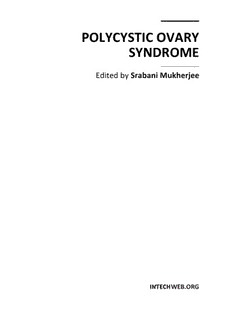
Polycystic Ovary Syndrome PDF
Preview Polycystic Ovary Syndrome
POLYCYSTIC OVARY SYNDROME Edited by Srabani Mukherjee Polycystic Ovary Syndrome Edited by Srabani Mukherjee Published by InTech Janeza Trdine 9, 51000 Rijeka, Croatia Copyright © 2012 InTech All chapters are Open Access distributed under the Creative Commons Attribution 3.0 license, which allows users to download, copy and build upon published articles even for commercial purposes, as long as the author and publisher are properly credited, which ensures maximum dissemination and a wider impact of our publications. After this work has been published by InTech, authors have the right to republish it, in whole or part, in any publication of which they are the author, and to make other personal use of the work. Any republication, referencing or personal use of the work must explicitly identify the original source. As for readers, this license allows users to download, copy and build upon published chapters even for commercial purposes, as long as the author and publisher are properly credited, which ensures maximum dissemination and a wider impact of our publications. Notice Statements and opinions expressed in the chapters are these of the individual contributors and not necessarily those of the editors or publisher. No responsibility is accepted for the accuracy of information contained in the published chapters. The publisher assumes no responsibility for any damage or injury to persons or property arising out of the use of any materials, instructions, methods or ideas contained in the book. Publishing Process Manager Molly Kaliman Technical Editor Teodora Smiljanic Cover Designer InTech Design Team First published February, 2012 Printed in Croatia A free online edition of this book is available at www.intechopen.com Additional hard copies can be obtained from [email protected] Polycystic Ovary Syndrome, Edited by Srabani Mukherjee p. cm. ISBN 978-953-51-0094-2 Contents Preface IX Chapter 1 Management of Women with Clomifene Citrate Resistant Polycystic Ovary Syndrome – An Evidence Based Approach 1 Hatem Abu Hashim Chapter 2 Psycho-Social and Sexual Well-Being in Women with Polycystic Ovary Syndrome 21 J.E. de Niet, H. Pastoor, R. Timman and J.S.E. Laven Chapter 3 Android Subcutaneous Adipose Tissue Topography in Females with Polycystic Ovary Syndrome: A Visible Phenotype Even in Juveniles 47 Moeller Reinhard, Giuliani Albrecht, Mangge Harald, Tafeit Erwin, Glaeser Margit, Schrabmair Walter and Horejsi Renate Chapter 4 Embryoprotective Therapy of Infertile Women with Polycystic Ovary Syndrome 61 Robert Hudeček and Renata Krajčovičová Chapter 5 Obesity in Polycystic Ovary Syndrome 77 Carlos Moran, Monica Arriaga, Gustavo Rodriguez and Segundo Moran Chapter 6 Association of Gestational Diabetes Mellitus in Women with Polycystic Ovary Syndrome and Evaluation of Role of Metformin in Reducing the Risk 93 Fauzia Haq Nawaz and Tahira Naru Chapter 7 Polycystic Ovary Syndrome and Cardiovascular Disease 105 Barış Önder Pamuk, Derun Taner Ertugrul, Hamiyet Yılmaz and M. Muzaffer İlhan Chapter 8 Polycystic Ovary Syndrome in the Non-Gynaecological Practice – Can We Use a Common Medical Approach? 137 Gyula Petrányi VI Contents Chapter 9 Implications of Insulin Resistance / Hyperinsulinemia on Reproductive Function in Infertile Women with Polycystic Ovary Syndrome 155 Tetsurou Sakumoto, Yoshimitsu Tokunaga, Yoko Terada, Hideaki Tanaka, Makoto Nohara, Aritoshi Nakaza and Masahiro Higashi Preface “The beginning of knowledge is the discovery of something we do not understand.” Frank Herbert (1920-1986) Polycystic Ovary Syndrome (PCOS) is a common heterogenous disorder in women of reproductive age. It is a leading cause of anovulatory infertility all over the world. Having an early onset during pre-pubertal years, it has been associated with many reproductive complications. Over the years there has been a paradigm shift in thought; it is no longer just a gynecological concern but has a strong metabolic component too. Women with PCOS have a markedly increased risk of developing central obesity, Type 2 Diabetes and cardiovascular diseases. Research in this field has been progressing at an incredible rate, however even with staggering data available, researchers have not been able to fully understand this endocrine enigma. Questions regarding its pathophysiology and its possible long-term reproductive and metabolic outcomes are being tackled by rigorous research, but no definite conclusions have been reached yet. The focus in this book is drawn towards understanding the clinical and metabolic manifestations, as well as the impact that they have on the psychosocial well-being in women with PCOS. Some therapeutic options such as the use of insulin sensitizing agents and ovulation inducers to improve fertility, as well as impact of lifestyle and dietary modifications to reduce obesity and its associated consequences, have been highlighted in this text. Analysis of this ongoing research has incited the search for alternative and improved treatments to alleviate these health concerns with great zeal. This book aims to offer fellow researchers a comprehensive overview of the current knowledge of the developments in this expanding field. Srabani Mukherjee Department of Molecular Endocrinology, National Institute for Research in Reproductive Health (ICMR), Mumbai, India
